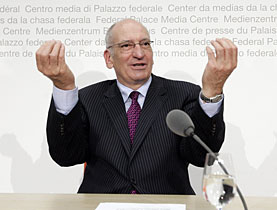Swiss abstain in UN Kosovo vote

The United Nations General Assembly in New York has approved Serbia's request to ask a UN court whether Kosovo's secession was legal.
However, Switzerland, like most of the 27 European Union states, withheld its vote on Wednesday, fearing a drawn-out legal investigation would slow Kosovo’s integration into the world community.
The International Court of Justice (ICJ) in The Hague is expected to take one to two years to issue its verdict.
After the vote – 77 votes in favour, six against and 74 abstentions – the Swiss ambassador to the UN, Peter Maurer, underlined the importance to Switzerland of promoting due process and international law.
“We consider the International Court of Justice an important tool for the peaceful settlement of conflicts,” he said, adding that peace, stability and socio-economic development in the western Balkans had been a priority for Swiss foreign policy since the 1990s.
For his part, Maurer believed Serbia’s request could lead to uncertainty and weaken stability and development.
Belgrade says seeking neutral judicial advice will help ease tension, but Kosovo’s supporters say it will slow Pristina’s international integration and encourage countries to delay decisions on whether to recognise Kosovo.
Swiss support
Forty-eight countries including the United States and most European Union members have recognised Kosovo since its ethnic Albanian majority declared independence from Serbia on February 17. Serbia and its ally Russia however oppose it.
Switzerland recognised Kosovo’s independence on February 27. A month later Swiss Foreign Minister Micheline Calmy-Rey, an outspoken and long-term supporter of independence for Kosovo, opened a Swiss embassy in Pristina.
Regarding Switzerland’s decision to recognise Kosovo’s independence – “made after careful examination of the legal situation”, according to Maurer – he told swissinfo he was convinced the ICJ would come to the same conclusions.
He also called on all parties involved “to focus their efforts on their political and economic future in Europe”.
Differences of opinion
After the vote Serbian Foreign Minister Vuk Jeremic thanked the assembly for its show of support.
However, division within the EU was clear. Cyprus, Slovakia, Romania, Greece and Spain voted with Serbia, breaking ranks with the majority of EU members, who abstained.
The United States, like Albania, opposed. US envoy Rosemary DiCarlo told the assembly that the Serbian request was “unnecessary and unhelpful”, adding, “Kosovo’s independence is irreversible”.
Jeremic rejected suggestions that Belgrade’s request was politically motivated and said seeking the court’s advice would reduce tensions and prevent Kosovo from becoming a precedent for secessionists elsewhere.
Olive branch?
In what could be an olive branch to Brussels, Jeremic appeared to confirm several diplomats’ statements that Serbia might drop its opposition to the EU assuming responsibility for policing Kosovo from the United Nations.
“Serbia is not opposed to EU engagement in any part of Serbia, including Kosovo,” he said. “Our red line is that it has to be … neutral.”
He also said there was no point recognising Kosovo while the ICJ process was underway. He made clear that Serbia would not tolerate recognition of Kosovo by other states in the region, including the former Yugoslav republic of Montenegro.
“If countries violate our territorial sovereignty, we will have to respond,” he said without giving details.
On Thursday Montenegro and Macedonia, two of Serbia’s close allies, signalled they were about to recognise Kosovo.
swissinfo, based on an article in German by Rita Emch in New York
Kosovo had been run by the United Nations, backed by Nato troops, since the alliance’s 1999 bombing campaign against Serb forces.
It unilaterally declared independence from Serbia on February 17, 2008 after internationally led talks to reach a mutual agreement on its status failed.
Switzerland recognised Kosovo’s independence ten days later.
In 2005, it was the first state in the world to call for independence for Kosovo.
Today, Switzerland is home to 170,000 to 190,000 Kosovars, about ten per cent of Kosovo’s population. Kosovars are the second largest minority in Switzerland after Germans.
About 200 Swiss peacekeepers are stationed in Kosovo.
Switzerland is one of the most important providers of foreign aid to the struggling nation, with about SFr16.5 million ($14.6 million) budgeted for projects there in 2008.
Kosovo had for decades been the poorest part of Yugoslavia and is only slowly recovering from the damage of its 1998-1999 war. Around 40 per cent of its overall population is unemployed.
The country’s development plan for 2008-2011 forecasts a shortfall of €1.4 billion.
Serbia lost control of what was its southern province in 1999, when Nato drove out Serb forces accused of mass killings of civilians in a two-year war on separatist guerrillas.
Landlocked Kosovo faces an uphill battle in getting back on its feet because Serbia, with strong Russian backing, remains vehemently opposed to its split from Belgrade. Serbia recalled its ambassador to Bern when Switzerland opened its Kosovo embassy in March.
Serbia and Russia have vowed to block Kosovo from joining international institutions such as the United Nations through which it could get more funding and aid.

In compliance with the JTI standards
More: SWI swissinfo.ch certified by the Journalism Trust Initiative












You can find an overview of ongoing debates with our journalists here . Please join us!
If you want to start a conversation about a topic raised in this article or want to report factual errors, email us at english@swissinfo.ch.